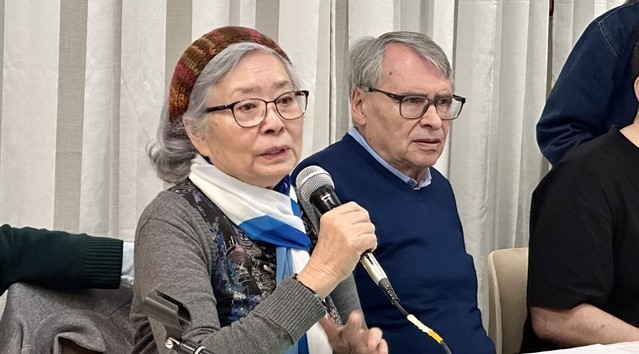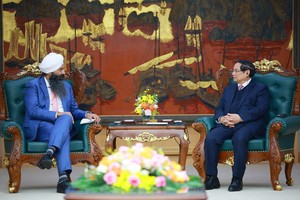
At the hearing, Bertrand Repolt and William Bourdon, two lawyers who have voluntarily given support to the 82-year-old woman in the lawsuit, argued that the chemical companies supplying herbicide for the US army to use in the Vietnamese battlefield must be held responsible for their actions and not be entitled to the “state immunity” for the excuse of serving the State of the US.
They pointed out that there is sufficient evidence proving those companies had voluntarily joined in the bidding and had the right to determine the production as well as the content of dioxin in the herbicide supplied for the US army in Vietnam during 1961 - 1971. These actions caused catastrophic consequences which still linger until today for people and the environment in Vietnam.
Nga is a dioxin victim and has suffered from very serious consequences, the lawyers said, noting that their client lost her first child, and her other children had to endure health problems while she also became cancerous.
They added the right to a trial is a fundamental right of Nga, and they hoped to regain justice for the victim.
For their part, the lawyers defending the 14 US chemical companies denied their clients’ responsibility, arguing that the firms had acted at the request of the US Army. Given this, they cited the state immunity that allows a sovereign state not to be prosecuted at a court of another sovereign state so as to deny the companies’ responsibility for the consequences caused by their products on the Vietnamese battlefield.
After three hours of listening to arguments from lawyers, the court judge announced that the ruling would be issued on August 22.
Talking to the media after the trial, the lawyers of Nga said their client didn’t intend to sue the State of the US but just wanted to show evidence to demand the chemical companies held responsible for their proactive and independent production of Agent Orange (AO) for commercial and profit-seeking purposes.
Repolt said a court in the US had concluded that herbicide was not a weapon of war, so those companies are not entitled to state immunity.
Meanwhile, Bourdon affirmed that he is confident in this legal struggle.
Nga told the press that the lawyers representing the US companies revealed many weaknesses such as only sticking to the state immunity to evade responsibility and using groundless arguments.
She said she felt more confident when seeing their weaknesses.
After the trial, the companies’ lawyers silently left but her lawyers and others stayed with her, showing that her struggle receives support because it is just and noble, Nga went on, expressing her determination to pursue the lawsuit until the end.
A number of overseas Vietnamese, French friends, and representatives of the Vietnam Association for Victims of AO/Dioxin also voiced their support for Nga as this is a symbolic struggle for not only herself but also millions of AO/dioxin victims in Vietnam and around the world.
Tran To Nga, born in 1942, graduated from a Hanoi university in 1966 and became a war correspondent for the Liberation News Agency, now the Vietnam News Agency. She worked in some of the most heavily AO/dioxin affected areas in southern Vietnam such as Cu Chi, Ben Cat and along Ho Chi Minh Trail, ultimately experiencing contamination effects herself. She suffered from five out of the 17 diseases, disorders, deformities, and malformations associated with dioxin exposure recognised by the US.
Among her three children, the first child died of heart defects and the second suffers from a blood disease.
In 2009, Nga appeared as a witness at the Court of Public Opinion in Paris against the US chemical companies.
On April 16, 2015, the Crown Court of Evry City in the suburb of Paris held the first hearing on the case, but since then, lawyers of the sued chemical companies tried every way to prolong the procedures.
On May 10, 2021, the Evry Crown Court rejected her lawsuit, saying it did not have jurisdiction over the case, a ruling that disappointed the Vietnamese and international public.
However, Nga and her lawyers decided to file an appeal, and the struggle for justice for AO/dioxin victims is still underway.
From 1961 to 1971, US troops sprayed more than 80 million litres of herbicide – 44 million litres of which were AO, containing nearly 370 kilogrammes of dioxin – over South Vietnam.
As a result, around 4.8 million Vietnamese were exposed to the toxic chemical. Many of the victims have died, while millions of their descendants are living with deformities and diseases as a direct result of the chemical’s effects.
























